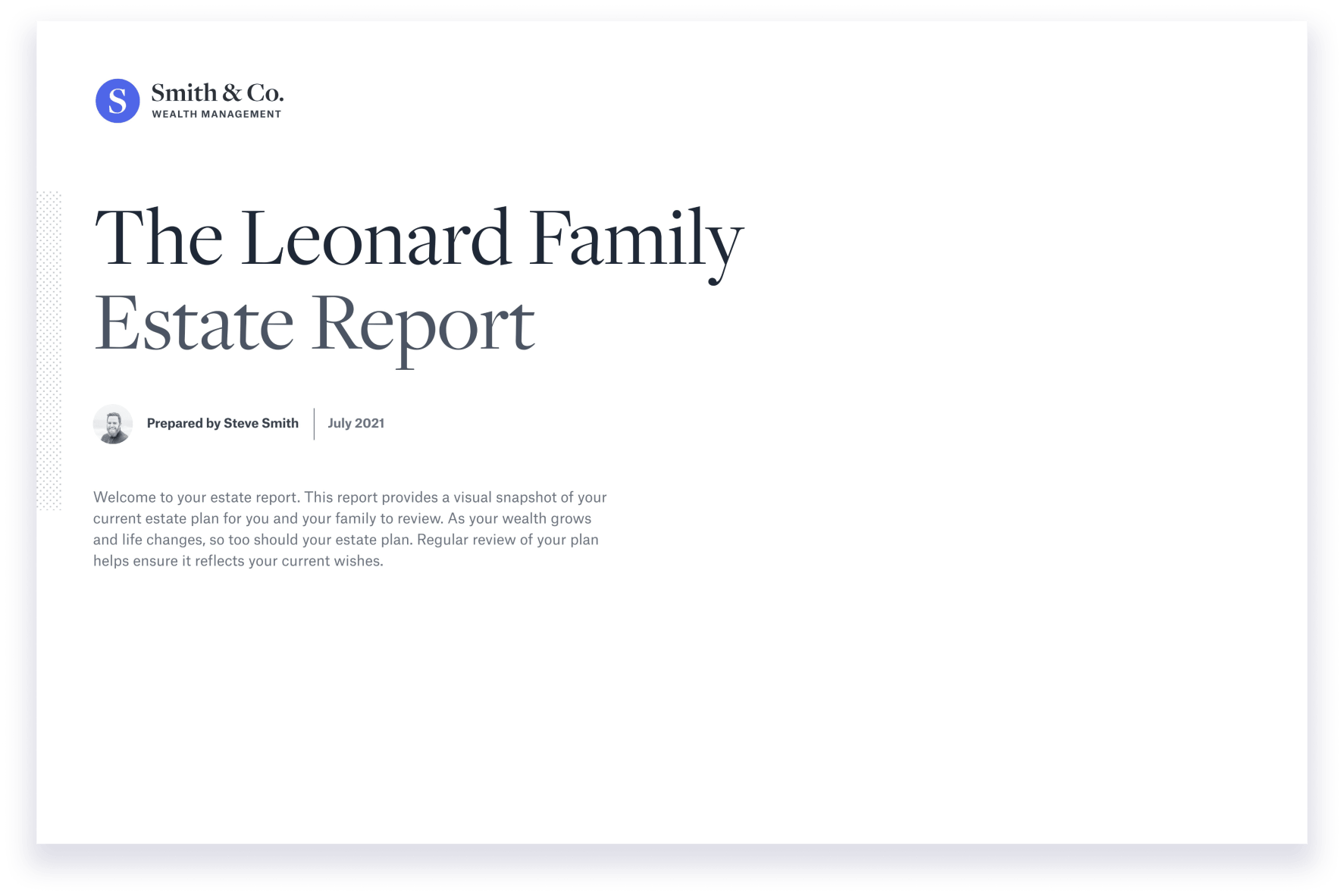 Vanilla
Vanilla
Family Estate Planning: An advisor’s guide to helping clients transfer wealth to the next generation

As the financial planning industry anticipates the Great Wealth Transfer from baby boomers to their heirs, reports show that at least 80% of adult children and heirs will find their own advisors after receiving an inheritance.
In other words, if you’re waiting until your client dies to introduce yourself to their family, you’ve waited too long to win their heirs as new clients.
But there’s good news: family estate planning provides the perfect opportunity to connect with your client’s family early on and cultivate an ongoing relationship that can extend into the next generation.
By anticipating their family’s estate planning needs at every milestone, not only do you show your client you want the best for them, you also find reasons to communicate with the next generation of clients, who will look to your expertise in their own financial affairs.
Get to know the client’s family
In the discovery and information-gathering stages of client onboarding, ask questions about the client’s relatives and their family goals. Establish an understanding of the people who may be impacted by your client’s financial decisions and discover possible opportunities to extend your services to other family members.
-
Ask about the client’s current marital status, number of children and/or grandchildren, and children’s ages.
-
Is the client’s family blended (i.e., children from previous marriages)?
-
Does the client plan to add new members to their family through adoption?
-
If the client has adult children, what is their marital status?
-
Does the client have siblings, nephews, or nieces?
-
Who in the client’s family performs caregiver roles for elderly parents or relatives with special needs?
-
Who in the client’s family is known to be financially responsible—and who has had problems with finances?
-
Who in the client’s family do they trust to understand and carry out their wishes?
-
Ask about the client’s financial goals for their family, both during and after the client’s lifetime.
The above information will give you context for family dynamics that will impact recommendations you’ll make later on. You may discover, for example, that while your client is close with their financially responsible adult niece, they are estranged from their eldest son, who has a history of making bad life and money decisions. That knowledge will help inform conversations with your client about who to designate as a trustee and who to empower with financial and medical decisions on their behalf.
Talking with the client about their family also helps you pinpoint prospects for your services and makes your outreach efforts more efficient. In the above situation, it would be advantageous to reach out to the favorite niece—and unwise to spend marketing resources on the estranged son.
Make estate planning a family affair
Once you get a clearer picture of your client’s family dynamics and goals, open up a conversation about their current estate plan and how it may impact their family.
Offer a family estate planning review
A smart way to get the conversation started is to have the client provide you with their existing estate planning documents. Go over the documents together with an estate planning attorney to see if everything’s current, including beneficiary designations.
Depending on how solid their estate plan is, an estate planning review can highlight vulnerabilities such as the risk of going to probate court and estate tax liabilities. It can also reveal gaps such as the lack of guardianship documentation for minor children, missing healthcare directives, and outdated beneficiaries on retirement accounts and life insurance policies.
You can use solutions like Vanilla’s estate planning platform to simplify and automate the document review process. To learn how to get started, get in touch.
Present an estate plan report
Where most financial planners stop at the document review, you can differentiate yourself by showing clients what these documents mean to the financial wellbeing of their family.
Using their existing documents, create a report that demonstrates what would happen to their assets if the client were to die today. To see what could be included in a report, download a sample below.

Think of the report as an illustration of the financial legacy your client will be leaving behind to loved ones and as charitable giving.
If your client is comfortable, this is a good time to invite key family members who will be impacted by the estate plan.
Get a read on how the current family estate plan reflects the client’s wishes
Once you’ve presented the estate plan report, talk with your client and their family about how it matches up with the desired outcomes your client has expressed.
-
Will the estate plan as it exists help achieve financial outcomes the client wants for the next generation?
-
Where are the gaps between the estate plan as it exists and the client’s wishes?
-
Is there anyone unintentionally left out of the estate plan who needs to be included?
-
Is there anyone included, like an ex-spouse or a relative who has died, who needs to be removed?
-
How would the client react if family members later fought over the estate?
Conversations about estate planning can be full of emotions for so many reasons, including complicated family dynamics and discomfort over contemplating death. If you frame the conversation as an assessment, it will help the client adopt a problem-solving mindset, and focus on outcomes and goals rather than their uncomfortable feelings. It will also make it easier for the client to make their wishes clear to their family—which will help everyone avoid unwanted surprises later on.
Revisit the estate plan at every family milestone
Families are always changing. To make sure that your client’s estate plan is up to date and reflects their wishes, perform regular check-ups—especially after major life events. If estate documents need to be drawn up or changed, refer your client to an estate planning attorney.
Marriage/divorce
If your client doesn’t already have a will or living trust, a marriage is a good opportunity to refer them to an estate planning attorney to set one up. Make sure their spouse is listed on all estate planning documents.
This is also a good time to discuss the financial future of the married couple: open up a conversation about retirement planning.
Conversely, if your client gets divorced, they’ll need to remove the ex-spouse from the estate plan.
Birth/adoption of a child
Upon the birth or adoption of a child, it’s wise to name a guardian in the case of the death or incapacity of the parent.
The client may also want to set up a trust and list the child as a beneficiary. Also, check to see if the child will be designated as a primary/contingent beneficiary for insurance policies and retirement plans. If the client lists a child as a primary beneficiary, they may also need to designate a custodian to manage the assets until the child reaches the age of maturity.
Child reaches adulthood
Once the child of a client turns 18, they need legal documents to reflect their wishes in case of death/incapacity, including a living will, privacy authorizations, and medical/financial powers of attorney.
This is an excellent opportunity to connect with the adult child so you can offer other financial planning services.
Death of a family member
If a relative who is included in the estate plan dies, it’s crucial that you discuss updating beneficiary or fiduciary designations with your client. If the client is comfortable, this may be a good time to introduce yourself to the newly named beneficiary or fiduciary.
Retirement
Once a client retires, it’s wise to discuss what should happen if they need long-term care. Work with an estate planning attorney to review and update documents that reflect the client’s desires for who should handle healthcare decisions and elder care, and make sure they have a financial power of attorney set up. They may also need to set up an annuity for their retirement funds.
If you haven’t already gotten to know the loved ones who will be responsible for their care in the client’s retirement years, make it a priority to do so.
Win trust with the entire family through estate planning
When you’re proactive about estate planning, you prove to everyone who has a stake in your client’s financial wellbeing that you care about more than just money. Vanilla’s comprehensive estate planning platform will help you and your clients stay ahead of their estate planning needs so you can earn trust and build connections into the next generation. If you want to learn more about Vanilla, get in touch.
Build relationships that go deeper than money
This article is for educational purposes only and should not be considered legal advice. If you feel that the information in this article is pertinent to your situation, you may wish to consult a qualified attorney for advice tailored to your circumstances.
Published: Jun 14, 2021
Holistic wealth management starts here
Join thousands of advisors who use Vanilla to transform their service offering and accelerate revenue growth.
